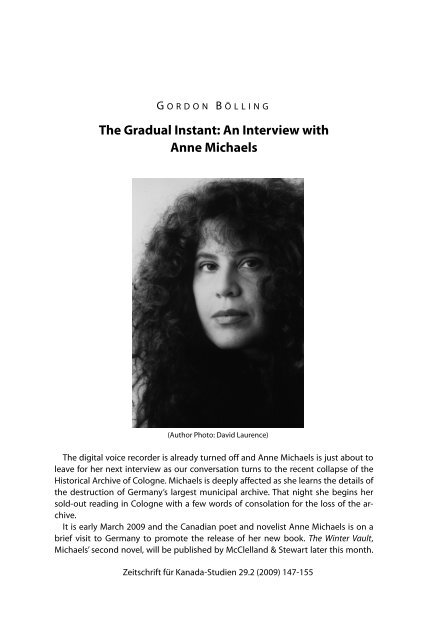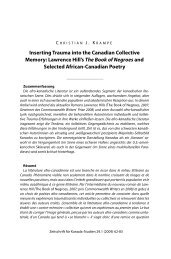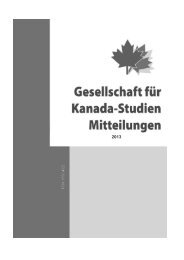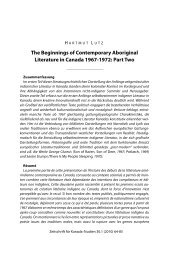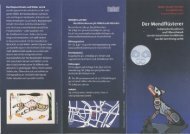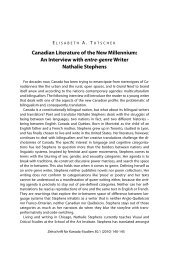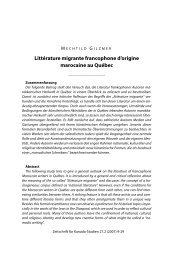The Gradual Instant: An Interview with Anne Michaels
The Gradual Instant: An Interview with Anne Michaels
The Gradual Instant: An Interview with Anne Michaels
You also want an ePaper? Increase the reach of your titles
YUMPU automatically turns print PDFs into web optimized ePapers that Google loves.
G ORDON B ÖLLING<br />
<strong>The</strong> <strong>Gradual</strong> <strong>Instant</strong>: <strong>An</strong> <strong>Interview</strong> <strong>with</strong><br />
<strong>An</strong>ne <strong>Michaels</strong><br />
(Author Photo: David Laurence)<br />
<strong>The</strong> digital voice recorder is already turned off and <strong>An</strong>ne <strong>Michaels</strong> is just about to<br />
leave for her next interview as our conversation turns to the recent collapse of the<br />
Historical Archive of Cologne. <strong>Michaels</strong> is deeply affected as she learns the details of<br />
the destruction of Germany’s largest municipal archive. That night she begins her<br />
sold-out reading in Cologne <strong>with</strong> a few words of consolation for the loss of the archive.<br />
It is early March 2009 and the Canadian poet and novelist <strong>An</strong>ne <strong>Michaels</strong> is on a<br />
brief visit to Germany to promote the release of her new book. <strong>The</strong> Winter Vault,<br />
<strong>Michaels</strong>’ second novel, will be published by McClelland & Stewart later this month.<br />
Zeitschrift für Kanada-Studien 29.2 (2009) 147-155
148 Gordon Bölling<br />
Translated as Wintergewölbe the novel is scheduled for release in Germany in late<br />
April 2009. As <strong>Michaels</strong> explains at the reading, the novel takes its title from a type<br />
of building in which the bodies of the dead are stored in winter when the ground is<br />
frozen so hard that it is impossible to bury them.<br />
<strong>An</strong>ne <strong>Michaels</strong> was born in Toronto in 1958. Prior to her success as a novelist, she<br />
had made a name for herself as a poet. Her first volume of poetry, <strong>The</strong> Weight of<br />
Oranges (1986), won the Commonwealth Prize for the Americas. Half a decade later,<br />
her second collection of verse, Miner’s Pond (1991), received the Canadian Authors<br />
Association Award for Poetry and was shortlisted for the Governor General’s Award<br />
and the Trillium Award. <strong>The</strong>se two volumes were reissued in a single-volume in<br />
1997. Skin Divers (1999) is her most recent book of poetry. <strong>Michaels</strong> also received<br />
international critical acclaim for her first novel. Fugitive Pieces, published in 1996,<br />
won the Chapters/Books in Canada First Novel Award, <strong>The</strong> City of Toronto Book<br />
Award, the Martin and Beatrice Fischer Award, the Trillium Book Award, an Award of<br />
Merit from Heritage Toronto, the Guardian Fiction Award, the Jewish Quarterly Prize<br />
for Fiction, the Orange Prize for Fiction, the Lannan Literary Award for Fiction, the<br />
Harold Ribalow Award, and the Giuseppe Acerbi Literary Award.<br />
Her German publisher, Berlin Verlag, has organized a tight schedule for <strong>Michaels</strong><br />
and as I meet her in the lobby of the Hotel im Wasserturm in central Cologne she<br />
has already done a day’s worth of press work. Despite the strains of travel, a full day<br />
of interviews and that night’s upcoming reading at the lit.Cologne 2009 Festival of<br />
Literature, she is happy to do an additional interview <strong>with</strong> an academic journal.<br />
When interviewed, <strong>Michaels</strong> often pauses for a moment before she answers a specific<br />
question in what is a reflective and calm voice.<br />
Gordon Bölling: You began your career as a writer of poetry and only later moved<br />
on to fiction. A similar pattern can also be traced in the biographies of Leonard<br />
Cohen, Margaret Atwood, and Michael Ondaatje. Is there a special reason why so<br />
many of Canada’s major authors began their careers as poets?<br />
<strong>An</strong>ne <strong>Michaels</strong>: I’m not sure one could generalize. I think that for me there came a<br />
point where I couldn’t do what I needed to do in that form. My task was different<br />
and so I couldn’t do what I needed to do in poetry. I can’t speak for the others. But<br />
for me there are certain large questions which I knew, in order to be truthful to the<br />
complexity of the questions and because some of those questions were very difficult<br />
to look at or questions which we maybe desire not to look at too closely, that I<br />
would have to unfold them over many pages. Being <strong>with</strong> the reader over two hundred<br />
or four hundred pages, one can unfold things differently and lead both the<br />
writer and the reader into places, difficult or painful places, because you have the<br />
time to do it. A poem doesn’t allow you that.<br />
GB: Even though some of your poems might be read as long poems?
<strong>The</strong> <strong>Gradual</strong> <strong>Instant</strong>: <strong>An</strong> <strong>Interview</strong> <strong>with</strong> <strong>An</strong>ne <strong>Michaels</strong> 149<br />
AM: Yes, but this notion of being in the company of a reader for days or weeks and<br />
to allow an exploration to take its time and to add level on level on level, that’s a<br />
different relationship <strong>with</strong> the reader.<br />
GB: When did you begin writing poetry?<br />
AM: Childhood.<br />
GB: <strong>An</strong>d you’ve been doing so ever since?<br />
AM: Yes. At a later stage I started novel writing, I’m just so interested in the form of<br />
it and what you can do and so that’s mostly what I’m doing now.<br />
GB: After you received your BA in English from the University of Toronto in 1980,<br />
you began teaching creative writing. Has this teaching experience had an influence<br />
on your writing?<br />
AM: Being a student has, because I had a marvellous professor at university. He<br />
died a few years ago, he was a wonderful, wonderful teacher. He, only for a couple<br />
of years, taught a class on rhetoric and that was an incredible experience. It was<br />
reading the text in a certain way. It was really trying to understand the intent of the<br />
author. I think that taught me a great deal. I’m now a professor of the Graduate<br />
Department at the University of Toronto. A few years ago they started graduate<br />
studies in creative writing. So now I’m a mentor, I’m not in the classroom. It’s like a<br />
thesis supervisor. I’m one-on-one <strong>with</strong> a student, one student a year. It’s always a<br />
pleasure to work <strong>with</strong> someone who is just trying to find their way. <strong>The</strong> program is<br />
for creating the draft of a manuscript. So you have someone working on a book for<br />
the first time. By the end of the year they have to do an oral defense and present<br />
their book; fiction or poetry, whatever is their choice.<br />
GB: Your home town Toronto plays a major role in your writings. This not only<br />
holds true for your novel Fugitive Pieces but can also be seen in your poetry. For<br />
example, your poem “<strong>The</strong>re Is No City that Does Not Dream” [from Skin Divers] appeared<br />
as part of the popular Toronto Transit Commission’s Poetry on the Way program<br />
and can be read as a tribute to your home town. What does Toronto mean to<br />
you as a writer?<br />
AM: We live in a time when most people don’t live in the same place where they<br />
were born. We don’t often die in the same place where we were born. But in my<br />
case, this is the city where I was born and I live there. <strong>The</strong>re has been phenomenal<br />
change as there would be in any city over time. For me, it’s almost archeological to<br />
see how the city grows up. That really does embody my relationship to the city. It’s<br />
many layers of experience and a certain kind of intimacy when you’ve gone through<br />
various kinds of loss in a place, even the loss of physical surroundings.<br />
GB: In your poetry you repeatedly turn to historical persons and use these as<br />
speakers in a series of dramatic monologues. In “<strong>The</strong> Second Search,” Polish physicist<br />
Marie Sklodowska Curie serves you as a lyrical I. In “Ice House,” Kathleen Scott, sculptor<br />
and wife of <strong>An</strong>tarctic explorer Robert Falcon Scott, mourns the death of her<br />
husband. Other poems focus on the lives of such diverse characters as Johannes
150 Gordon Bölling<br />
Kepler, Isak Dinesen (Karen Blixen), and Osip Mandelstam. What are the difficulties<br />
in writing about historical persons?<br />
AM: <strong>The</strong> inherent difficulty is that one can never know enough. You can research<br />
for years and never know enough. <strong>The</strong>re has to be an absolute respect for one’s own<br />
ignorance and also for the person whose voice you are attempting to speak from.<br />
GB: How much research goes into such poems as “<strong>The</strong> Second Search” and “Ice<br />
House”?<br />
AM: Years. <strong>The</strong> ratio of product to amount of time spent is ridiculous. For me, if<br />
there’s an inner connection or I feel that that life embodies a way of looking at certain<br />
ideas then I just read as much as I can and think about it. A fact in itself is not<br />
productive but the meaning of a fact is. That takes time and I would rather feel I’m<br />
getting it right than rush. Patience is very important. In those poems, now looking<br />
back I can see very much this being drawn towards character that is so part of novel<br />
writing and the desire to have certain ideas embodied in a character and to be allowed<br />
to explore certain ideas through a character.<br />
GB: When do you reach a point at which you feel that you know enough to reimagine<br />
your historical characters’ lives?<br />
AM: I think there is an intuition maybe. Sometimes you read and there is a tiny<br />
reference to a gesture, to the tiniest thing, and suddenly you feel a great understanding<br />
for the person. With Marie Curie, there were photographs of Marie <strong>with</strong> her<br />
husband or her children. Or, this image where she stirred this brew of pitch blend<br />
like a witch at her cauldron for months and months and months no matter what the<br />
weather. She had this determination, like a mad cook, to stir until she could reduce<br />
and reduce to get to that essential. I think there was something about that image<br />
and that determination. Both the domesticity of the image, a very domestic almost<br />
cooking kind of image, and yet a very acute scientific mind. <strong>The</strong> two things together<br />
made me feel I captured something about her.<br />
GB: Do you feel an obligation to stay true to the historical record as far as it is established?<br />
AM: Yes, I feel a great responsibility to that. I don’t mess around <strong>with</strong> the facts. If<br />
there is a truth there then it’s a truth that comes from the facts and not a manipulation<br />
of the facts.<br />
GB: As a German I was, of course, particularly interested in your poems on Alfred<br />
Doeblin, Johannes Kepler, and Paula Modersohn-Becker [“Sublimation,” “A Lesson<br />
from the Earth,” and “Modersohn-Becker,” respectively. All of which are collected in<br />
the second section of Miner’s Pond]. What made the biographies of these historical<br />
figures so compelling for you?<br />
AM: In the case of Modersohn-Becker there is this struggle in her life, a moment of<br />
decision. With Kepler, too. We are led to moments of great inner resolve where we<br />
have to make a choice and this was very interesting to me. With Kepler, he had a<br />
tremendously profound vision of how he felt the universe worked. Many things<br />
came together in his notion of how the universe worked. His numbers didn’t actu-
<strong>The</strong> <strong>Gradual</strong> <strong>Instant</strong>: <strong>An</strong> <strong>Interview</strong> <strong>with</strong> <strong>An</strong>ne <strong>Michaels</strong> 151<br />
ally always work out. <strong>An</strong>d then there has to come an inner decision how one proceeds<br />
from there. This is fascinating to me. With Paula Modersohn-Becker, it was a<br />
personal decision and it had to do <strong>with</strong> a reconciliation between her personal life,<br />
her emotional life, and her work. For her that reconciliation was extremely difficult.<br />
She could not figure out how to put the two together and she had to make a choice.<br />
She ended up making more than one choice. But these moments of choosing interested<br />
me very much in trying to take them apart and to figure out how they arrived<br />
there.<br />
GB: Did you ever get the chance to visit Worpswede?<br />
AM: No, though I would very much like to visit. Is it still an artists’ colony?<br />
GB: Yes, I think so. <strong>The</strong>y still have artists in residence and there are also numerous<br />
exhibitions open to the public. What is your understanding of the genre of the dramatic<br />
monologue? <strong>An</strong>d in how far do your poems differ from the genre conventions<br />
as established by someone like Robert Browning?<br />
AM: That’s a big question. I’m not sure how much I strayed from the conventions.<br />
When I wrote them I felt very much that they were poems to be read aloud perhaps<br />
more than any others.<br />
GB: <strong>The</strong> Holocaust and life after the Holocaust are at the center of your first novel<br />
Fugitive Pieces. <strong>The</strong> Holocaust is probably one of the, if not the most difficult historical<br />
event to write about. What made you want to write about the Holocaust and<br />
how did the novel originate?<br />
AM: I think that for my generation it’s almost impossible not to find your relationship<br />
to that event. It’s like the brick wall two inches from your face that goes up to<br />
heaven. It’s an unavoidable topic. <strong>The</strong> novel began, as these things always do for<br />
me, <strong>with</strong> a cluster of questions which would just not go away. That first image of the<br />
boy burying himself in order to survive, that was a very haunting image to me. <strong>An</strong><br />
image of the depth of grief involved in a child being in this circumstance of digging<br />
a grave in order to live and <strong>with</strong> that image the whole story came.<br />
GB: Fugitive Pieces relies on a remarkable narrative design. Consisting of two autobiographical<br />
narratives, the novel in its first part chronicles the life of Jacob Beer,<br />
who as a young child survives the Holocaust in Poland. <strong>The</strong> second part tells the life<br />
story of Ben, who did not witness the Holocaust himself but is the son of Holocaust<br />
survivors. Why did you decide to approach the experience of the Holocaust from the<br />
perspective of two generations?<br />
AM: It was very important to me that, in a sense, the first story haunts the second<br />
story. We all inherit the past, whether it’s a very personal past, whether it’s the larger<br />
historical past, both those things. So it seemed essential to have both parts to the<br />
book; both the generation that experiences and the generation that inherits. It’s the<br />
beginning of thinking about how we remember, how we commemorate. <strong>The</strong> question<br />
that sometimes the very way in which we commemorate an event is also the<br />
way in which we forget it is also very much part of the new book. This notion that<br />
we all, whether we’re conscious of it or not, inherit what has come before is impor-
152 Gordon Bölling<br />
tant to me. I wanted very much for the narratives to be separated so that, in a way,<br />
it’s a haunting. We find out right at the beginning that Jacob dies. So Jacob haunts<br />
the book.<br />
GB: Despite the fact that Jacob Beer and Ben belong to different generations their<br />
life stories show a number of parallels. For example, both their narratives begin <strong>with</strong><br />
a flooded city, Biskupin in Poland in Jacob’s case and Toronto in Ben’s case. In addition,<br />
both narrators finally move towards a place of love and achieve a kind of reconciliation<br />
<strong>with</strong> their personal histories. Why is it that their vastly different experiences<br />
of history and the Holocaust lead Jacob and Ben in similar directions?<br />
AM: <strong>The</strong> whole book is woven together <strong>with</strong> many layers and echoes and repeating<br />
metaphors and many levels of connective tissue, which is very important to me<br />
because these things are complexities. I try to get into a question in as many ways<br />
as possible to allow the reader many doors into the same questions.<br />
GB: Would you say that their experiences are similar?<br />
AM: I think some of their questions are similar.<br />
GB: Fugitive Pieces can also be read as an extended meditation on time and history.<br />
For example, you make use of imagery and metaphors taken from such fields<br />
as archeology and geography to approach the past. Could you explain your understanding<br />
of history and how it informs the present?<br />
AM: It’s a moral question. In moral terms, there is no before and after, then and<br />
now. How we live determines how we will act at any given moment. Our ability to<br />
do the right thing is not going to just suddenly spring from us out of nowhere. Our<br />
doing the right thing is like a muscle. Morality is a muscle and has to be used. Our<br />
doing the right thing depends on how we have lived before that moment comes to<br />
us. History is the gradual instant, the gradual present. [“<strong>The</strong> <strong>Gradual</strong> <strong>Instant</strong>” is also<br />
the title of a chapter in Fugitive Pieces.] In other words, there is a responsibility in<br />
daily life, in that daily life is what becomes history. It is the source of the formation of<br />
the huge event. It’s not separate from how we live every day. People always ask<br />
“How could it have happened?”, “How did this happen?” when, in fact, it’s not so<br />
hard to see how it happened. History erupts from the present moment.<br />
GB: In their focus on history Fugitive Pieces and a number of your poems are representative<br />
of contemporary Canadian literature. Since the late 1960s and early 1970s<br />
to the present Canadian writers have shown an abiding interest in history; from<br />
such classics as Leonard Cohen’s Beautiful Losers and Robert Kroetsch’s <strong>The</strong> Ledger to<br />
more recent works such as Guy Vanderhaeghe’s <strong>The</strong> Englishman’s Boy and Joseph<br />
Boyden’s Three Day Road. What, in your opinion, is the attraction of the past for<br />
contemporary Canadian novelists and poets?<br />
AM: I’m going to make a sweeping generalization which one could respond to<br />
<strong>with</strong> as many exceptions. But I think there is a kernel of truth in this, that it has<br />
something to do <strong>with</strong> the fact that so much of the population has come from elsewhere.<br />
As soon as one goes from one place to another there is a history to be told,<br />
there is a before, there is a where one came from, there is a life divided in half, in two
<strong>The</strong> <strong>Gradual</strong> <strong>Instant</strong>: <strong>An</strong> <strong>Interview</strong> <strong>with</strong> <strong>An</strong>ne <strong>Michaels</strong> 153<br />
pieces, and so it’s a national characteristic. It’s a country of immigrants. Joseph Boyden,<br />
of course, is a good example of people writing from the need to express an<br />
indigenous history. It’s set up from the very nature of the fact that it’s a largely immigrant<br />
country. That immediately sets up a relationship to history.<br />
GB: In the acknowledgements to Fugitive Pieces, you mention British novelist, essayist,<br />
and art critic John Berger as an inspiration. What is it that you admire in Berger’s<br />
work?<br />
AM: Most of all, I admire a kind of essential gut humanism. <strong>The</strong>re is an absolute<br />
humanist view that pervades his books. <strong>An</strong>d there is a certain courage in his way of<br />
storytelling. Some of his books, he himself says so, are hard to put into categories,<br />
but the form is perfect for what has to be said. You can’t imagine any other form for<br />
it. This is the courage of the storyteller to tell the story as truthfully as possible in<br />
whatever form it takes. <strong>An</strong>d I admire his precision. <strong>The</strong>re is never an imprecise word<br />
or an imprecise thought. <strong>The</strong> precision of his thinking is fantastic.<br />
GB: It’s interesting to see that John Berger has also been a great influence on Michael<br />
Ondaatje. In fact, Ondaatje’s latest novel, Divisadero, is dedicated to Berger<br />
and his wife. Who else would you feel a certain kinship <strong>with</strong>? From whom did you<br />
learn?<br />
AM: That is such a hard question to answer. King Lear, Measure for Measure, Thomas<br />
Hardy, Rilke, Dostoevsky, Akhmatova. [Here, <strong>Michaels</strong> hesitates for a moment.]<br />
It’s a huge list and I could go on and on. People ask that question and it’s a good<br />
question. <strong>An</strong>d in some cases a writer might say “Absolutely, this was a turning point<br />
in my career, in my thinking” but for me it’s a matter of small gradations.<br />
GB: Your first novel quickly became a great success. Fugitive Pieces won a series of<br />
literary prizes, was a national bestseller in your native Canada for more than two<br />
years, and also gained you a large international readership. How has this success<br />
changed your life as a writer?<br />
AM: This question of a readership is the most important. For a writer what could<br />
be more important than feeling a readership? I received hundreds and hundreds of<br />
letters from readers and still receive them for that book. When you’re writing a book<br />
you’re carrying the burden of that story. In my case, because I’m dealing <strong>with</strong> historical<br />
events, there is maybe an added burden for someone doing that and yet you<br />
feel you must carry these things. When you have a reader, someone who really has<br />
deeply read the book, then, in a way, you can put that burden down. You might say<br />
“Now the story is in someone else’s mind. <strong>The</strong>se questions are now being considered<br />
by someone else.” Thus, you can put that burden down and move on to the<br />
next one. I feel a responsibility to people who’ve read that book and I would like<br />
them to come <strong>with</strong> me into this new book.<br />
GB: Do you have an ideal reader in mind when writing a book? I’m asking because<br />
your books place huge demands on readers. <strong>The</strong>y are certainly not what one would<br />
call an easy read.
154 Gordon Bölling<br />
AM: I am very conscious of writing in a way that allows the reader a place in the<br />
book. I want the reader to come into the book. <strong>The</strong> whole way the book is structured<br />
is for the reader to come into the book. It’s like an actor on stage who knows<br />
that the best way to get the audience’s attention is not to shout at them; the best<br />
way is to whisper. <strong>The</strong>n the audience comes forward to see what’s happening. In a<br />
similar way, I want the reader to move closer and go into the book. Looking at large<br />
ideas, large questions, there always has to be a feeling attached to it. It can’t be an<br />
abstract notion, so the combination of thinking and feeling is really important to<br />
me.<br />
GB: Your second novel, <strong>The</strong> Winter Vault, will come out later this month. When did<br />
you begin work on this book and how did it originate?<br />
AM: I started working on this one even before the other book was published. It<br />
originated, again, from a number of questions and a very powerful image. If you<br />
haven’t read the book, it’s hard to explain. <strong>The</strong> opening scene takes place at the site<br />
of a temple which is being dismantled because a huge dam is being built, the Aswan<br />
Dam, which will flood the entire area. <strong>An</strong>d so they’re saving the temple by<br />
taking it apart and they are going to reerect it higher up. But in taking it apart and in<br />
putting it together, something crucial is being lost. So there is a scene between two<br />
characters at the site of that temple and that opening image is what brought everything<br />
together.<br />
GB: Like Fugitive Pieces, <strong>The</strong> Winter Vault takes its readers to a number of very different<br />
countries. Your new novel covers a time span of several decades and is set in<br />
Canada as well as in England, Egypt, and Poland. How difficult is it to capture all of<br />
these times and places in a single book?<br />
AM: It’s difficult. Also because I’m not interested in comparison, I’m interested in<br />
connection. It’s easy to compare things, it’s not so easy to understand what really<br />
connects things. For me, it’s a great challenge and a pleasure to begin to understand<br />
the connections between things that might seem superficially not to be connected.<br />
GB: In your novels as well as in your poetry you easily transcend an exclusive focus<br />
on Canadian subject matters and themes and instead move on to larger international<br />
or even universal narratives. This, of course, holds true for a number of contemporary<br />
Canadian writers. <strong>The</strong> works of <strong>An</strong>ne Carson, Michael Ondaatje, and<br />
Rohinton Mistry come to mind. How important is this transgression of national<br />
boundaries for you?<br />
AM: It’s essential. Certainly we live in a time when our consciousness of the world<br />
is inseparable from our everyday life. So it would seem very unnatural to me to<br />
ghettoize experience that way. Even the most intimately nationalistic event, for<br />
example the Cypress Hills Massacre, I think, has larger connections. [<strong>The</strong> Cypress<br />
Hills Massacre of 1873 is at the center of Guy Vanderhaeghe’s award-winning novel<br />
<strong>The</strong> Englishman’s Boy (1996).]
<strong>The</strong> <strong>Gradual</strong> <strong>Instant</strong>: <strong>An</strong> <strong>Interview</strong> <strong>with</strong> <strong>An</strong>ne <strong>Michaels</strong> 155<br />
GB: Now that your second novel is about to be published, do you have any new<br />
projects that you are currently working on?<br />
AM: I’m already a good ways into another novel.<br />
GB: Which books are you currently reading? Is there anything you’d like to recommend?<br />
AM: For some reason my mind always goes numb when I’m asked that question.<br />
Other writers have told me that happens to them too and I’m not sure why. I do a lot<br />
of reading for research and I’m great reader of non-fiction. In terms of novels …<br />
[Searching for names, <strong>Michaels</strong> pauses for a brief moment], I love W. G. Sebald. Austerlitz<br />
is my favourite of his. He is a wonderful, wonderful writer.<br />
GB: What do you like about Austerlitz?<br />
AM: It’s the precision about things for which it is very hard to be precise. Ineffable<br />
things, and yet they are expressed <strong>with</strong> an acute precision. <strong>An</strong>d what he does <strong>with</strong><br />
time in all of his books is very clever and very masterful because he almost recreates<br />
a sense of time. Or, he recreates one’s experience of time which is very difficult to do<br />
because it’s more than memory, it’s a present imbued <strong>with</strong> past. He is a master. <strong>An</strong>d<br />
also, of course, the way in which the intimate life is connected to the larger historical<br />
circumstance. That’s a relationship that fascinates me.<br />
GB: Thank you for the interview. I look forward to the reading tonight.


